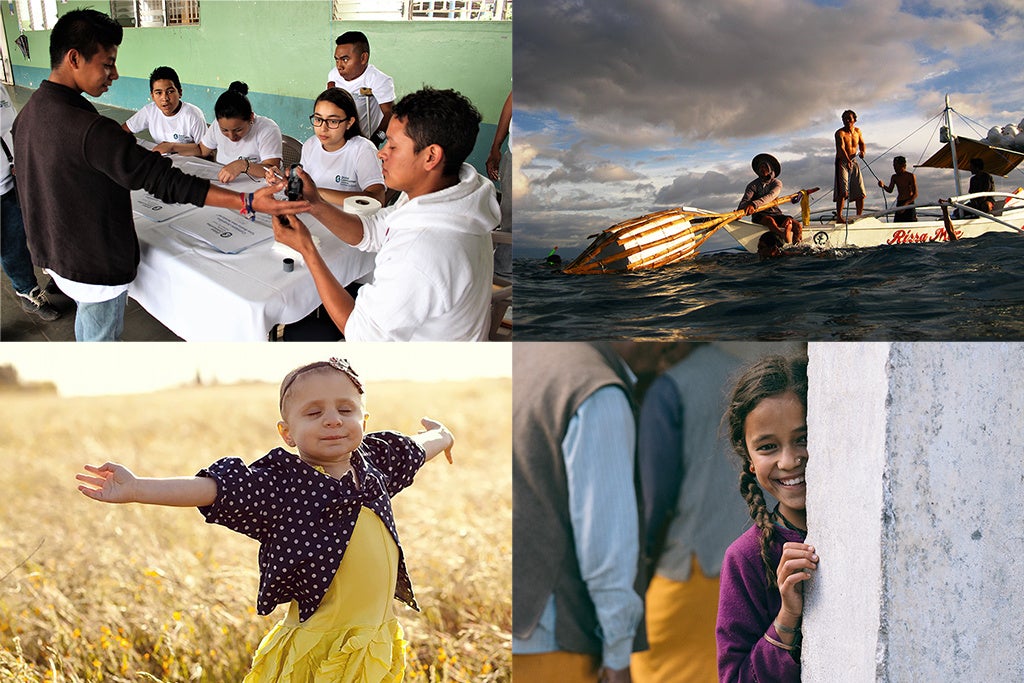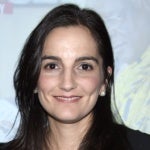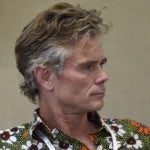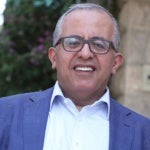
Since 2008, the John P. McNulty Prize has celebrated and elevated the work of individuals who are using their exceptional leadership abilities, entrepreneurial spirit, and private-sector talents to change the world, a movement being led by the Aspen Global Leadership Network. Each year, at the Resnick Aspen Action Forum and the Institute’s Annual Gala in New York, the McNulty Prize honors individuals who are addressing the planet’s foremost social, economic, and environmental challenges.
The prize, founded by Anne Welsh McNulty in honor of her late husband, is a primary initiative of the McNulty Foundation awarded in partnership with the Institute’s Aspen Global Leadership Network. Prize nominees are all AGLN fellows with exceptional leadership ventures—the projects fellows embark on to tackle the societal problems they see around them. The winner receives $100,000 to further his or her venture, and each of the other laureates receives $25,000. The winner is selected by a jury of worldrecognized leaders: currently, they are former Secretary of State Madeleine Albright, Ford Foundation President Darren Walker, international statesman Olara Otunnu, and development expert Brizio Biondi-Morra. Previous juries have included former President of Ireland Mary Robinson, Bill Gates Sr., and entrepreneur Sir Richard Branson.
Since the establishment of the prize, the McNulty Foundation has recognized more than 40 laureates for their high-impact ventures addressing many of the world’s most intractable problems. The laureates use their experience from private-sector and nonprofit careers to find innovative solutions to everything from pollution to poverty, politics to food security, and education to finance. Always, however, the solution emerges from the very people they seek to help.
When the first prizewinner, Jordan Kassalow, realized that charity was not enough to deliver eyeglasses to those who need it, he helped develop a “business-in-a-bag” model that allowed women in rural areas of Bangladesh to become one-person eyeglass shops—able to evaluate most basic kinds of vision impairment and prescribe the correct glasses. Not only did this create thousands of entrepreneurs who could make a profit and increase the distribution of badly needed eyewear, the people who bought them were often middle-aged artisans who gained another 20 years of productive income because they now had the sight to work. The ripple effect is potent: both the new income from women selling glasses and the avoided burden of losing work in their 40s means that artisans’ children can stay in school, investments can be made to start new businesses, and the cycle of poverty has a chance of ending.
This virtuous cycle of opportunity and empowerment is a hallmark of all the laureates. NEXT, the name of an independent newspaper and journalistic enterprise, produced fearless investigative journalism to help Nigerians hold their government accountable. CenteringPregnancy South Carolina empowers women to make better-informed health choices and reduce their odds of preterm birth—in turn, giving their children a lifetime of improved opportunities. Youth Local Councils gives young Palestinians, and now young people around the world, the chance to get involved in their municipalities and learn self-governance firsthand.
This ethos is grounded in the values of the prize’s namesake, John P. McNulty. The child of Irish immigrants, McNulty saw firsthand the difference that education and opportunity made in his life compared with his parents. He also realized that the opportunities he received were still distributed unequally—an injustice that robbed so many people of their potential simply by the lottery of birth, whether through prejudice, poverty, environment, violence, or any other barrier. The McNulty Foundation and the leaders it seeks to recognize and inspire through the prize aim to remedy these imbalances, to pass on the spark of opportunity, and to ignite the potential of all people.
Johnny McNulty is the director of communications and Nina Sawhney is the program manager at the John P. & Anne Welsh McNulty Foundation.
The Next Decade
Since 2008, the McNulty Foundation has recognized more than 40 laureates working in over 25 countries and has invested over $4 million in their ventures, supporting work that has touched millions of lives. Inspired by the work of the very leaders it has recognized, the Foundation started the McNulty Prize Catalyst Fund. This new philanthropic fund will provide direct support to organizations both in the United States and abroad enabling them to broaden the reach of their work, to deepen their impact at existing sites, or enable them to serve larger numbers of beneficiaries.
How Young Palestinians Have Become a Global Model for Democracy
Lana Abu-Hijleh is the 2017 winner of the John P. McNulty Prize and a Middle East Leadership Initiative Fellow of the AGLN. She is being honored for founding the Youth Local Councils, created in Palestine and now replicated abroad.
After working with the United Nations and major nongovernmental organizations in development for years, Lana Abu-Hijleh saw the need for a grassroots movement from Palestine’s youth, who make up more than half of the region’s population. So in 2008 she founded the Youth Local Councils to let young Palestinians take ownership of—and gain experience in—self-government.
These voluntary electoral bodies mirror the positions and structure of local municipal councils, and anyone aged 15 to 22 can vote or run for two-year terms. Participating youth receive hundreds of hours of training and take on real projects in their communities, ranging from making municipal buildings accessible to people with disabilities, to building parks for families and communities, to launching collaborative political campaigns that influence national policy.
Now, in over 45 communities across the West Bank, more than 25,000 youth participate in the program—and 92 percent of them say that the YLC has improved their understanding of democracy. As Palestine’s youth come of age, YLC alums are taking up formal leadership positions, both in civil society and as elected city councilmembers, deputy mayors, and more.
Their example has also attracted noticed abroad: the YLC model has been replicated in Honduras and will soon spread to Ukraine. Anywhere young people need to be engaged and where faith in self-government needs to be shored up, the YLC model can be adapted to show people of all ages and nationalities that democracy and self-government are still the best ways to build a better future.
The 2017 McNulty Prize Laureates
 Carolina Freire
Carolina Freire
VOLUNTARIOS DE PANAMA | Panama
Uniting a broad network of private, public, and nonprofit participants, public-policy specialist Carolina Freire is shifting Panama’s national culture around civic engagement. By spearheading Panama’s first-ever national volunteer platform, Freire is propelling citizens to address challenges in their own communities. Already, more projects are being undertaken than ever before, and Panamanians are bridging divides to form a common identity.
 Bruce Robertson
Bruce Robertson
TRAIL | Uganda
Following the devastation of Northern Uganda by the Lord’s Resistance Army, agriculture executive Bruce Robertson is rebuilding the region’s economy and the livelihoods of smallholder farmers through agronomy training, financial literacy, and access to markets and capital. By doing what nonprofits could not—guaranteeing a market for crops—TRAIL has proved itself to be a dynamic engine of growth for northern Uganda as a whole.
 Amjad Tadros
Amjad Tadros
SYRIA DIRECT | Jordan and Syria
Training new generations of Syrian reporters, entrepreneur and award-winning journalist Amjad Tadros is ensuring that Syrian perspectives are heard and that the world has access to objective, truthful, in-depth reporting from Syria. Syria Direct is often not only the best but the only organization covering many of the important stories coming out of the region. Its graduates are laying the groundwork for a new era of journalism in Syria and across the Middle East.